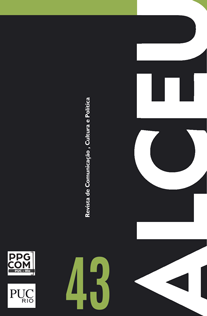Cli-fi and dystopian narratives on the future
The espace of irony in Downsizing
DOI:
https://doi.org/10.46391/ALCEU.v21.ed43.2021.216Keywords:
Dystopian Narratives, Future, Science Fiction, DiscourseAbstract
The article discusses, from the critique of a fictional work, the discursive dimensions of irony in the dystopian narrative of the future, in which the inexorable advance of consumerism, capitalist progress and its impacts on the global climate crisis threatens human life and the very survival of the planet. Methodologically, the text explores the Bakhtinian concepts of the language of laughter in shaping the social senses, seeking to identify its potential as an argumentative strategy. The analysis points to the discursive efficacy of irony to address irremovable human behavior in the face of the pleasures of the inexhaustible pleasures of permanent leisure and consumerism and the failure of the Guattarian autopoietic machine in the production of new subjectivities and collective agency for the production of new realities, both phenomena necessary to face the imminent environmental collapse.
Downloads
References
GUATTARI, Félix. As três ecologias. Campinas: Papirus, 1990.
______. Psicoanalisis y transversalidad. Buenos Aires: Siglo XXI, 1976.
HARVEY, D. Condição pós-moderna. São Paulo: Edições Loyola, 1992.
JUNQUEIRA, Antonio Hélio. A gula de Flusser e o futuro ultratecnológico da comida: entre a ficção científica e a ciência ficcional". Intexto - Edição Especial: Dossiê Flusser - 100 anos, Porto Alegre, UFRGS, p. 280-299, 2020.
KLEIN, Naomi. This changes everything: capitalism vs the climate. New York: Simon & Schuster, 2014.
LATOUCHE, Serge. Pequeno tratado do decrescimento sereno. Lisboa: Edições 70, 2012.
LAVAL, Christian. Habitar ou dominar: as lições de uma tragédia. In: FRESSATO, Soleni Biscouto; NÓVOA, Jorge (Orgs.). Soou o alarme: a crise do capitalismo para além da pandemia. São Paulo: Perspectiva, 2020.p. 461-473
LUKACS, Göyrgy. El cine como linguaje crítico. Nuevos Aires, ano 2. n .5,set./nov. 1971.
MARQUES FILHO, Luiz César. Capitalismo e colapso ambiental. Campinas: Editora da Unicamp, 2018.
MATURANA, Humberto; VARELA, Francisco. De máquinas y seres vivos. Autopoieses: la organización de lo vivo. Santiago do Chile: Editorial Universitária, 1998.
NEBRASKA. Direção: Alexander Payne. Produção: Albert Berger; Ron Yerxa. Estados Unidos da América: Paramount & Bona Fide Production, 2013. (DVD). (110 min).
O INCRÍVEL HOMEM QUE ENCOLHEU (The incredible shrinkin man”). Direção: Jack Arnold. Produção: Albert Zygsmith. Estados Unidos da América, 1957. (DVD). (81 min).
QUERIDA, ENCOLHI AS CRIANÇAS (Honey, I shrunk the kids). Direção: Joe Johnston. Produção: Penny Finkelman Cox. Estados Unidos da América: Walt Disney Pictures, 1989. (DVD). (94 min).
REES, Martin. Our final hour: a scientist's warning: how terror, error, and environmental disaster threaten humankind's future in this century - on earth and beyond. New York: Basic Books, 2003.
SANDAGE, Scott A. Born losers: a history of failure in America. Boston: Harvard University Press, 2005
SANT’ANNA, Affonso Romano. Paródia, paráfrases & Cia. São Paulo: Editora Ática, 2003. (Série Princípios).
SFEZ, Lucien. A saúde perfeita: crítica de uma nova utopia. São Paulo: Edições Loyola, 1996.
STENGERS, Isabelle. No tempo das catástrofes – resistir à barbárie que se aproxima. São Paulo: Cosac Naif, 2015.
WEIL, Simone. A condição operária e outros escritos sobre a opressão. Org. por Ecléa Bosi. Rio de Janeiro: Paz e Terra, 1979.
Downloads
Published
How to Cite
Issue
Section
License
Copyright (c) 2021 Revista ALCEU

This work is licensed under a Creative Commons Attribution-NonCommercial 4.0 International License.






